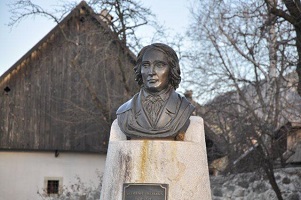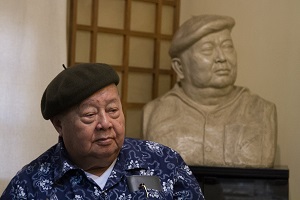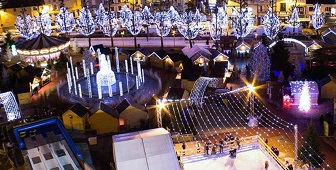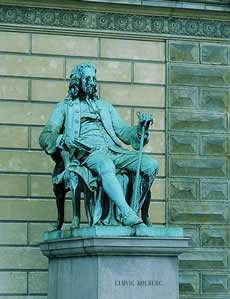De Sloveense dichter en schrijver France Prešeren werd geboren op 3 december 1800 in Vrba. Zie ook alle tags voor France Prešeren op dit blog en ook mijn blog van 3 december 2010.
A Wreath of Sonnets (3/14)
Since from my heart’s deep roots have sprung these lays,
A heart not to be silenced any more;
Now I am like to Tasso who of yore
Would sing his Leonora’s fame and praise.
He could not plead his love whose tortouous maze
Bemused his years of youth, and fiercely tore
His life beyond all hope; and yet he bore
The burden he revealed in secret phrase.
My passion is aflame, although I find
Your glance gives me no hope when you are near;
Lest I offend, my lips are sealed by fear.
My poor heart’s fate, so bitter and unkind,
My secret burden – all this they make dear,
These tear-stained flowers of a poet’s mind.
A Wreath of Sonnets (4/14)
These tear-stained flowers of a poet’s mind,
Culled from my bosom, lay it wholly bare;
My heart’s a garden: Love is sowing there
Sad elegies each with my longing signed.
You are their sun whose radiance, purblind,
I seek in vain at home and everywhere,
In theatre, on promenade and square,
Midst revels where the chains of dancers wind.
How often through the town with watchful eyes
I wander, praying for a fate more kind,
Yet catch no glimpse of that elusive prize.
I shed my tears to loneliness confined:
Hence all these songs which from my love arise;
They come from where no man can sunshine find
Vertaald door V. de Sola Pinto

France Prešeren (3 december 1800 – 8 februari 1849)
Borstbeeld bij zijn huis in Vrba.
De Filipijnse schrijver F. Sionil José werd geboren op 3 december 1924 in Rosales, Pangasinan. Zie ook alle tags voor F. Sionil José op dit blog.
Uit: Tong
“Conrado Lopez fell deeply in love for the first time when he was thirty. It was one of those beautiful things destined to bleakness and from the very beginning, he had an inkling that this was how it would be. And all because Alice Tan was Chinese.
When he first saw her, it seemed as if she had blossomed straight out of a Chinese art book; she had a complexion as clear as it was fair. When he got to know her better, he used to trace the blue veins in her arms, the blood vessels in her cheeks. Her nose was perfect, and her Chinese eyes had a brightness that could dispel the gloom which came over him. Long afterwards, when he remembered her eyes, how she looks, how she smiled, an intense feeling akin to physical pain would lance him.
Alice Tan’s parents used to run a small grocery store in Ongpin; both came from Fookien and Alice could trace her family back to Amoy. Conrado Lopez did not know his lineage beyond his great grandfather and not interested in the Chinese traditional kinship system. But he got so interested afterwards, he started to delve into his own background. He lived with his spinster sister, Remedios, in a small house in Makati, a sidestreet parallel to Rizal Avanue in Santa Cruz. He had inherited the house with its pocket-size yard from his parents. The lower floor which had its own entrance was rented out to a lawyer who was adept at fixing things at City Hall. He and his sister lived in the second floor which had two bedrooms, a living-dining room and a toilet and kitchen with antique fixtures. His sister looked after the house, his clothes and his general well being. Conrado had finished accounting at one of the Azcarraga universities and would have accounted to something more than being an accountant in Makati and his older sister whom he supported. It was because of such a responsibility that he had never really been serious with any girl.
He was unprepared for Alice Tan; in fact, in the beginning, he was not sure at all about his feelings for her. It started in March when brownouts were frequent so that when the lights went out that early evening, he thought it was another brownout. But he noticed that the lights in the other house were on so he immediately concluded there must be something wrong with the fuse so he threw the main switch off and change it. But he had hardly thrown the switch on when the line on the ceiling started sputtering. Then a loud report and darkness.”

F. Sionil José (Rosales, 3 december 1924)
De Duitse dichter, folkzanger en jurist Franz Josef Degenhardt werd geboren op 3 december 1931 in Schwelm. Zie ook alle tags voor Franz Josef Degenhardt op dit blog en ook mijn blog van 3 december 2010.
Nocturn
Und wenn in den tausendwabigen Türmen,
den Reihenhauskolonien und Blocks
die müdetrainierten Dauerlaufhelden
in schnarchenen Zügen vom Lebensglück träumen,
und wenn
in den arkadischen Villengefilden,
bewacht von elektronischen Spinnen,
zu den Schäferspielen der Gymnasiasten
die Death-Metal-Band Orkanstürme losläßt,
und wenn
in den Sammellagern der Außenbezirke
die Flüchtlinge in das Dunkel horchen
um weiterzufliehen, weil lauter und lauter
der Sieg versprochen, Heil angedroht wird,
und wenn
die Crash-Kids vom Bahnhof längst bei ihren Lovern
im seidenen Kissen Kopfschüsse probieren,
die Autostrich-Huren am Fischmarkt bekiffte,
betrunkene Freier und Freifraun verarzten,
und wenn
im Mondlicht zwischen den Bankkathedralen
auf dem Disneyland-Pflaster der Fußgängerzone,
das silbern – wie naß von Roßpisse – schimmert,
das letzte Discopaar noch einen Tanz tanzt,
dann
werden auf dem Platz hinterm Stadion, wo
die abgewrackten Container lagern,
die Litaneien der Nocturn gebetet,
der, der sich der neue Wacholderpapst nennt,
betet vor.
Gepriesen werden
die klirrenden Flammen und dröhnenden Schwaden,
das brandige Trommeln und rauchende Knistern,
die Engel in jener Stadt der Teufel,
die Teufel in jener Stadt der Engel,
wie die
mit Baseball-Schlägern und Fahrrad-Ketten
und Morgensternen und Molotow-Cocktails
Vitrinen zertrümmern, Autos zerdeppern,
durch splitterndes Glas in die Kauftempel stürmen,
wie sie
Hosen zerfetzen und Stiefel zerreissen,
in Nerzmäntel Delikatessen schmieren,
mit Big-Macs klütern, Perlen schmeissen,
mit Brautkleidern und Krokodilleder-Taschen
behängt,
und Schlüpfern auf Köpfen und Hartgummi-Schwänzen
auf Nasen gestülpt, alte Tänze tanzen,
den Todeswalzer vergangener Tage,
den Lebens-Blues der kommenden Nächte,
oh yeah
Domine exaudi nos,
Domine exaudi nos,
Domine exaudi nos,
Domine audi nos.
So respondieren die Lagergenossen
und auch paar Piraten und City-Marder
und auch paar Standard-Boys and -Girls,
die wissen wollen, was sonst uns noch blüht,
o yeah.
Zuweilen kommen auch paar noch von früher,
die Unbelehrbaren, die immer noch träumen,
mit Spott und Trauer und Wermut-Tränen,
dem Morgenrot überm Hafen entgegen,
o yeah.

Franz Josef Degenhardt (3 december 1931 – 14 november 2011)
De Franse schrijver, criticus, theaterdirecteur en journalist Jules Claretie werd geboren op 3 december 1840 in Limoges. Zie ook alle tags voor Jules Claretie op dit blog en ook mijn blog van 3 december 2010.
Uit: Jean Mornas
“Il avait été attiré dans ce quartier de Montmartre par la curiosité banale de la fête populaire, l’appétit de ces macabres gaietés foraines qui semblaient à son pessimisme plus ironiques encore et plus irritantes que les kermesses mondaines dont il lisait les descriptions dans les journaux. Il éprouvait, ce Jean Mornas, une sorte de volupté douloureuse à heurter sa détresse de fils de bourgeois avide et pauvre aux rires niais des pitres de baraques, aux tapages des tirs en plein-vent, aux musiques criardes des chevaux de bois qui tournaient, tournaient, tournaient comme des vols d’illusions mortes ou des rondes de feuilles tombées, roulées par les vents d’automne. La déchirante mélancolie des orgues pénétrait en lui avec l’acuité d’une plainte humaine. Et il était demeuré là, dans le coudoiement brutal de cette foule, jusqu’au moment où, peu à peu, le boulevard extérieur s’était vidé, les baraques s’éteignant, lentement, une à une, et le sommeil et l’ombre tombant lourdement sur ces théâtres de saltimbanques, ces étalages de marchands ambulants dont les devantures se fermaient comme des paupières fatiguées. Il ne restait plus, çà et là, ouvertes encore, que de vagues boutiques où de maigres rôdeurs, imberbes et jeunes, jouaient des pièces blanches à des gageures étranges, avec les yeux luisants et les contractions de lèvres de brelandiers mondains risquant une fortune à une table de baccarat. Après les avoir longtemps regardés, trouvant tout simple, lui l’ambitieux de vingt-huit ans, qu’on tentât et même au besoin qu’on violât la fortune, Jean Mornas songea à regagner sa chambre triste dans un petit hôtel du quartier Latin, et lentement quitta la file des baraques presque éteintes, où, ça et là, apparaissaient seulement des lumières assoupies par la toile verte des tentes, cette toile aux longs plis de tentures funèbres qui clapotait au vent d’hiver. »

Jules Claretie (3 december 1840 – 23 december 1913)
Kerstmarkt in Limoges
De Noorse schrijver Ludvig Holberg werd geboren in Bergen op 3 december 1684. Zie ook alle tags voor Ludvig Holberg op dit blog en ook mijn blog van 3 december 2010.
Uit: Jeppe of the Hill(Vertaald door Oscar James Campbell, jr.)
“JEPPE. Now the sow’s going in to eat her breakfast, while I, poor devil, must walk four leagues without bite or sup. Could any man have such a damnable wife as I have? I honestly think she’s own cousin to Lucifer. Folks in the village say that Jeppe drinks, but they don’t say why Jeppe drinks: I didn’t get as many blows in all the ten years I was in the militia as I get in one day from my malicious wife. She beats me, the bailiff drives me to work as if I were an animal, and the deacon makes a cuckold of me. Haven’t I good reason to drink? Don’t I have to use the means nature gives us to drive away our troubles? If I were a dolt, I shouldn’t take it to heart so, and I shouldn’t drink so much, either; but it’s a well-known fact that I am an intelligent man; so I feel such things more than others would, and that’s why I have to drink. My neighbor Moens Christoffersen often says to me, speaking as my good friend, “May the devil gnaw your fat belly, Jeppe! You must hit back, if you want your old woman to behave.” But I can’t do anything to protect myself, for three reasons: in the the first place, because I haven’t any courage; in the second, because of that damned Master Eric hanging behind the bed, which my back can’t think of without blubbering; and thirdly, because I am, if I do say it who shouldn’t, a meek soul and a good Christian, who never tries to revenge himself, even on the deacon who puts one horn on me after another. I put my mite in the plate for him on the three holy-days, although he hasn’t the decency to give me so much as one mug of ale all the year round. Nothing ever wounded me more deeply than the cutting speech he made me last year: I was telling how once a savage bull, that had never been afraid of any man, took fright at the sight of me; and he answered, “Don’t you see how that happened, Jeppe? The bull saw that you had bigger horns than he, so he didn’t think it prudent to lock horns with his superior.” I call you to witness, good people, if such words would not pierce an honorable man to the marrow of his bones. Still, I am so gentle that I have never even wished my wife dead. On the contrary, when she lay sick of a jaundice last year, I hoped she might live; for as hell is already full of bad women, Lucifer might send her back again, and then she’d be worse than ever. But if the deacon should die, I should be glad, for my own sake and for others’ as well, for he does me nothing but evil and is no use to the parish. He’s an ignorant devil, for he can’t sing a note, much less mould a decent wax candle. Oh, but his predecessor, Christoffer, was a different sort of fellow. He had such a voice in his time that he sang down twelve deacons in the Credo. Once I started to quarrel openly with the deacon, when Nille herself heard him call me a cuckold. I said, “May the devil be your cuckold, deacon!”

Ludvig Holberg (3 december 1684 – 27 januari 1754)
Standbeeld in Kopenhagen
